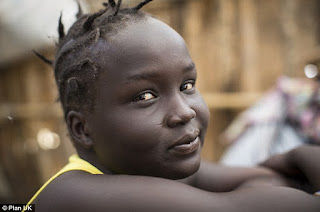The Struggle to Educate Young Women in South Sudan
 On the Voice of America website, the publication posted an article about South Sudan. In the article, many world leaders, including those fighting for education for women, are quoted as discussing some of the problems facing many young women in South Sudan.
On the Voice of America website, the publication posted an article about South Sudan. In the article, many world leaders, including those fighting for education for women, are quoted as discussing some of the problems facing many young women in South Sudan. In the article it is clear that in South Sudan, along with a variety of other countries, young women are being kept away from schools.
According to many Gayle Smith, "It's a global crisis that perpetuates poverty." This means that Smith believes that young women not being educated is a sure means for societal destruction and rivals that of poverty which many countries are currently struggling to eliminate as a social problem.
In the article, 130 million girls are not in school and further more girls in South Sudan are the least likely to be in school.
The article also goes onto state that his problem is not solely occurring in South sudan. Rather it is a global issue and a major problem in Africa. The article states, "In South Sudan, 73 percent of girls aged 6 to 11 are not in school. In the Central African Republic, there is only one teacher for every 80 students and in Niger only 17 percent of girls and women are literate, the report found."
Voices of America later reports in the article that some people are in fact seeking social change. The text states, "Attitudes toward education for girls are starting to change across Africa as more parents see sending their daughters to school not only as a chance to improve their futures, but also to boost the family's fortunes, experts say."
This is a step in the right direction. While it is still socially acceptable to keep young women from getting an education many people are debating from this social norm. This provides hope to a new generation of young women in Africa because it can ensure social and political change for young women across the continent.
While this may be a shock to some people in the western world because young women do have access to education, the lack of social change regarding young women is not a global social norm. It is important for young women to speak up and be heard around the world and this can start with many people discussing, writing, and blogging about problems regarding feminism on an international platform. Voice of America is doing right by the young women in South Sudan and around the world, by brining awareness to this problem, and showing that with a change in perceptive, attitude, and modern feminism, the lives of many young women can change around the world.

Comments
Post a Comment